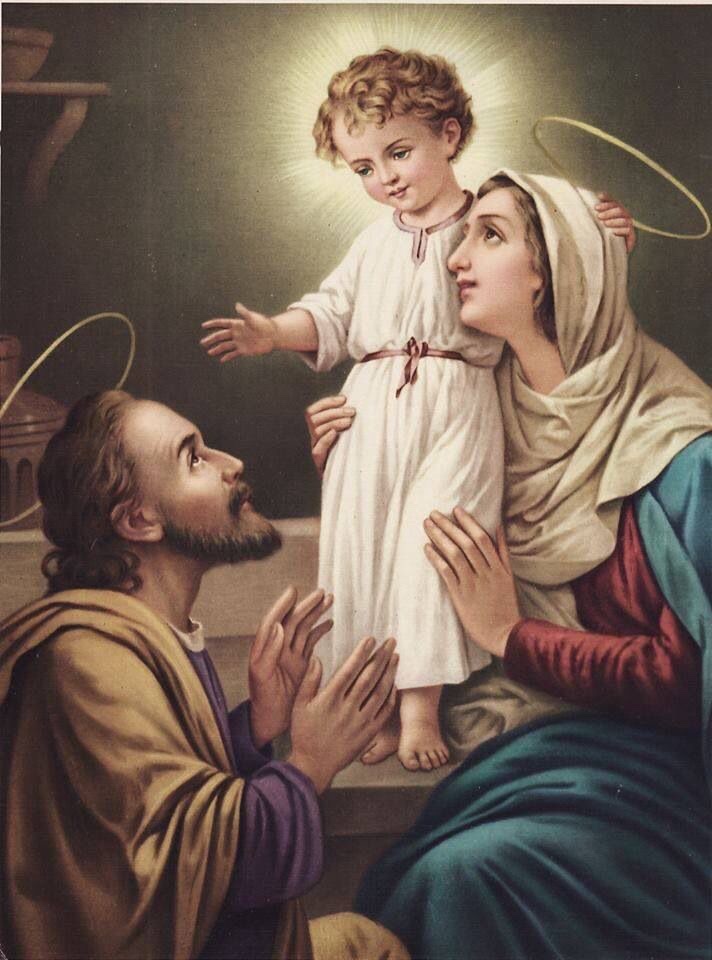As Father’s Day is celebrated this weekend, it caused me to reflect upon fatherhood, and it also brought to mind something that many people might not know—the IRREPLACEABLE importance of fathers regarding the spiritual lives of children, society and the world.
This statement is almost revolutionary in our “everyone is equal” world that we are living in. A world that has tried its best to negate the role of men to merely a difference in chromosome.
But the facts don’t lie. Fathers DO matter.
But for purposes of this post, let me focus upon what I consider to be the most important aspect—and unfortunately, the most often neglected part of fatherhood in our world today–spiritual fatherhood.

Importance of Fathers in the Spiritual Life of Children
In 2015, I was privileged to participate in the World Meeting of Families held in Philadelphia. During the gathering, Dr Scott Hahn, a prominent theologian and Biblical scholar, shared some statistics about the importance of fathers:
1. If both father and mother attend church regularly, then 33 percent of their children will end up as regular churchgoers, and 41 percent will end up attending irregularly. Only a quarter of their children will end up not practicing at all.
2. If the father is irregular and mother regular, only 3 percent of the children will subsequently become regulars themselves, while a further 59 percent will become irregulars. Thirty-eight percent will be lost.
3. If the father is non-practicing and mother regular, only 2 percent of children will become regular worshippers, and 37 percent will attend irregularly. Over 60 percent of their children will be lost completely to the church!
Does the dramatic increase of the “Nones” (those who claim no religious affiliation) in the last 20 years ring a bell for anyone?
In short, if a father does not go to church – no matter how faithful his wife’s devotions – only one child in 50 will become a regular worshipper. If a father does go regularly, regardless of the practice of the mother, between two-thirds and three-quarters of their children will become churchgoers (regular and irregular).
Now one of the reasons suggested for this distinction is that children tend to take their cues about domestic life from Mom while their conceptions of the world outside of the home come from Dad. So if Dad takes faith in God seriously, then the message to their children is that God should be taken seriously.

Importance of Spiritual Fatherhood in the Family
In a article posted on his blog in June, 2016, Father Richard Heilman wrote the following about these same findings:
“This study confirms the essential role of father as spiritual leader, which I would argue is true fatherhood. Fathers are to love their wives as Christ loves the church, modeling the love of the Father in their most important earthly relationship. Fathers are to care for their children as our Father in heaven cares for us and finally, fathers play a primary role in teaching their children the truth about reality. It is the father who should instruct his children in their understanding of the world from a consciously and informed Christian worldview. It is the father who is essential for sending his children forth with a biblical view of reality and a faith in Jesus Christ that is rooted in solid understanding.”[1]
In his post, Father Heilman highlights three things that a father should do as a spiritual leader: 1) take seriously the responsibility of his role as spiritual leader; 2) love his wife and their children; and 3) teach his children the truth of reality by giving them a worldview that is aligned with God’s commandments and teachings.
These three components are the KEYS to spiritual fatherhood. But unfortunately, due to a myriad of reasons, many men today either seem to be ignorant of, refuse to take responsibility for, or have been legally and culturally stripped of their authority to even act as the fathers they were created to be.
So what can a man do?
Find a role model.
Saint Joseph as the Role Model of Spiritual Fatherhood
For Catholics, the preeminent model of fatherhood is Saint Joseph. St. Joseph is described in Sacred Scripture as a “righteous man,” the husband of Mary, and Virgin father to their son, Jesus.
Responsibility
First, Joseph takes responsibility for his own spiritual life. How do we know this? Because he is described as a righteous and just man. One does not become righteous—to be “right” with God—if one does not put God and what God desires first in one’s life. Then, in order to continue to be a just and righteous man, one must continue to be formed and informed by God, to have a relationship with Him, and this can only happen through daily conversation with God—i.e. in prayer.
The evidence that Joseph had a deep and profound relationship with His Heavenly Father is evident in how Joseph responded to the messages sent to Him via angels in his dreams. At two separate times in the Gospel of Matthew, it is reported that “an angel of the Lord appeared to Joseph in a dream,” who then communicated a message to Joseph about an action Joseph was to take, and then upon waking, Joseph did exactly what he had been instructed to do.
Such responsiveness and obedience does not come from someone who does not already have a deep and profound relationship with his Heavenly Father and His messengers. Rather, it demonstrates the depth of the relationship that must have already been present in Joseph’s life because Joseph did not hesitate to trust what he had been instructed to do and was completely obedient to it.
Dedication to His Spouse
Second, Joseph loved his spouse, Mary, and Jesus, completely. He set aside his desires in order to ensure that they were protected and cared for. How else can you describe Joseph’s willingness to drop everything at the drop of a hat (or in this case a message from an angel in a dream) to immediately migrate to a foreign country where he had no family, no job, and no house?
And then later on after their return to Nazareth, Joseph continued to care for Mary, even ensuring she would be cared for after his death. How? By preparing and training his son to eventually earn a livelihood as a carpenter, and by ensuring through his model of cherishing Mary that Jesus would know how to be a righteous man as well.

Teaching His Son With Authority
The most important task of Joseph’s fatherhood was in his formation. Joseph would have been the one who introduced Jesus to the Psalms, took him to synagogue, showed him how to raise vegetables in the garden, the intricacies and lessons found in the natural world around them, as well as instructing him in the trade of carpentry.
But in addition to all of that, Joseph would have taught Jesus the Law. And for a righteous Jewish man, the Law and living in accordance with the Law was paramount. It was life. Not a life of constraint, but a life for. Living according to the Law was something to be desired above all things, for by doing this, one could be assured of the Heavenly Father’s love and care.
It was all of these things that Joseph taught to his son, Jesus, and Jesus, as Joseph and Mary’s son, was “obedient to them.”
It is in these three ways that Joseph exemplifies what fatherhood, particularly spiritual fatherhood should look like, and why he should be looked to as a role model for all men desiring to do the same in their own lives today.

The Importance of Spiritual Fatherhood for the World
The statistics shared by Scott Hahn at the World Meeting of Families have been in our midst now for almost 20 years as the study was originally conducted in 1994 and then published in 2000.
The growth of the “Nones” continues to increase with every year that passes, yet our society and culture continues to negate the importance of the role of men by declaring that fathers are not even needed, or that fathers are no more important in the life of a child than a mother is.
This is despite the fact that statistics continue to show that the religious practice of the father is the determining factor for the future attendance, or absence from, church for children.
In 2003, this observation was made: “No father—no family—no faith. Winning and keeping men is essential to the community of faith and vital to the work of all mothers and the future salvation of our children.”[2]
I would argue that this statement can be extrapolated to the world at large as we can see the damage that is occurring in the absence of signs of fatherhood, especially spiritual fatherhood.
Signs of Hope
But signs of hope can be found for those who look for them.
More men striving for righteousness and embracing lives in accordance with God’s law. More men choosing to live chastely before and during marriage in honor and out of truly sacrificial love for their spouse. Husbands joyfully sacrificing to love and protect and care those entrusted to them. Men who are seeking to become spiritual fathers in the image of Saint Joseph by becoming responsible for their spiritual lives and embracing a relationship with their Heavenly Father.
Father Heilman challenged his audience in 2016, “It is time for fathers to return to honorable manhood and reconsider their priorities and realign them with God’s commands, decrees, and laws, teaching these things to your children.”
His challenge unfortunately, is still applicable across the societal and cultural landscape today.
So this Father’s Day, my prayers, as both woman and mother, is for ALL men to have the courage to embrace your personal call to live out your vocation of fatherhood as deeply, passionately, and uncompromisingly as you are capable of–for the good of all our children, all our families and the entire world. So that you become a sign of hope.
And may you do it as well as Saint Joseph.

[1] Fr Richard Heilman, Blog post, “If Dad Takes Faith in God Seriously, So Will His Children,” June, 2016.
[2] Robbie Low, Touchstone magazine, “The Truth about Men and the Church”, June, 2003.



